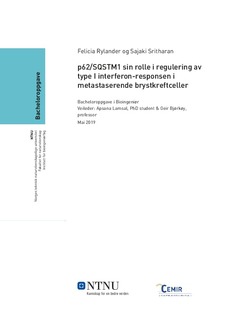p62/SQSTM1 sin rolle i regulering av type I interferon-responsen i metastaserende brystkreftceller
Bachelor thesis
Permanent lenke
http://hdl.handle.net/11250/2610810Utgivelsesdato
2019Metadata
Vis full innførselSamlinger
Sammendrag
Kreft er en genetisk sykdom som karakteriseres av ukontrollert proliferasjon av celler i et vev. Brystkreft er en av de hyppigste kreftformene på verdensbasis, og har også flest overlevelser i Norge. Det er flere typiske kjennetegn på kreft, hvor evnen til å unngå immunforsvarets destruering er et av dem. Immunsystemets overvåkning er viktig for å kunne gjenkjenne og eliminere kreftceller før de danner en svulst.
Type I interferon (IFN)-respons spiller en viktig rolle i anti-kreft-immunrespons, da flere studier viser at økt ekspresjon av type I IFN-stimulerende gener korrelerer med en bedre sykdomsprognose. Forskningsgruppen har tidligere funnet at den metastaserende cellelinjen 66cl4 har en konstant aktivering av type I IFN-respons når cellene dyrkes i cellekultur. Imidlertid er hele denne responsen nedregulert i tumorer dannet av de samme cellene. I dette prosjekt skulle vi forsøke å finne hva som gjør at type I IFN-responsen kan være aktivert uten at cellene eksponeres for kjente aktivatorer av denne responsen. Vi skulle også forsøke å finne hvorfor denne responsen skrus av i svulster dannet av de samme cellene.I prosjektet ble cellelinjen 66cl4 og varianter av denne benyttet, i tillegg til 67NR. Disse er en del av tumormodellen 4T1 fra BALB/c mus. Utleverte transkriptomdata for disse cellelinjene ble benyttet som grunnlag for de ulike forsøkene. Cellekulturer fra de spesifikke cellelinjene ble utsatt for aminosyresult, autofagi-inhibering og TBK1-inhibering, og deretter analysert for type I IFN-respons i form av CXCL10-produksjon. Dette ble gjort for å se på om p62 og autofagi regulerer type I IFN-responsen.
Resultater viser klart at økt mRNA-nivå av CXCL10 gir bedre prognose for østrogen- og progesteronreseptor-negative brystkreftpasienter. Både Western blot og ELISA viser tydelig at 66cl4-celler danner betydelig mer CXCL10 enn 67NR. Om cellene sultes for aminosyrer, øker autofagien, dermed reduseres også CXCL10-produksjonen. Inhibering av TBK1 med ulike inhibitorer hemmer også dannelsen av CXCL10. Nedslag av p62 hos 66cl4-klonene E8 og E11 resulterte i kraftig redusert produksjon av CXCL10, i forhold til villtypen. Ut ifra resultatene kan det bekreftes at autofagi og p62 regulerer type I IFN-responsen og dannelse av CXCL10.
Resultatene kan forhåpentligvis benyttes til å forstå hva som gjør ulike tumorer immunologisk aktive (varme) eller inaktive (kalde), og hvordan de inaktive kan aktiveres, for eksempel ved å aktivere type I IFN-responsen. Det er samtidig viktig å unngå kontinuerlig type I IFN-respons, da dette assosieres med immunsuppresjon, og kobles til dårlig respons på visse behandlinger. Cancer is a genetic disease characterized by uncontrolled proliferation of cells in a tissue. Breast cancer is one of the most common types of cancer at world basis, and the one with highest survival in Norway. Cancer has several features, one of them being evading immune destruction. Immune surveillance plays an important role in the recognition and elimination of upcoming tumours, but somehow cancer cells evade this. Type I interferon (IFN)-response plays an important role in anti-cancer immune response as various studies shows that elevated expression of type I IFN-stimulating genes correlates with a better prognosis. The research group has previously found that cell line 66cl4 has a constant activation of the type I IFN-response when growing in a culture. However, this response is downregulated in the same cells when forming a tumour. In this project, it was examined how type I IFN-response can be activated without the cells being exposed to known activators. In addition, tests were performed to find out why this response is shut down in tumours made of the same cells.
For this project the 66cl4 cell line and versions of it were used, in addition to 67NR. These belong to the 4TI tumour model from BALB/c mouse. Distributed transcriptome data for these cell lines where used as foundation for the project. The cells were exposed to various conditions and analysed for type I IFN-response in the form of CXCL10-production. In addition, studies with starvation of the cells for amino acids, and inhibition of autophagy as well as TBK1, were performed to see if p62 and autophagy regulates type I IFN-response.
The results clearly show a correlation between high mRNA-levels of CXCL10 and a better prognosis for estrogen- and progesterone-receptor-negative breast cancer patients. Both Western blot and ELISA distinctly shows that 66cl4 cells produce far more CXCL10 than 67NR does. When the cells are under starvation, autophagy increases, resulting in decreased CXCL10-production. Inhibition of TBK1 also inhibits the production of CXCL10. Knockdown of p62 in the 66cl4 clones E8 and E11 resulted in greatly reduced CXCL10-production, compared to 66cl4 wild type cells. Based on these results it can be confirmed that autophagy and p62 regulates type I IFN-response and production of CXCL10. Hopefully, these results can be used for understanding the mechanisms that make tumours immunologically active (hot) or inactive (cold), and how the inactive tumours can be activated by for example activating type I IFN-response. At the same time, continuous type I IFN-response must be avoided as it is associated with immunosuppression and bad response to certain treatments.
